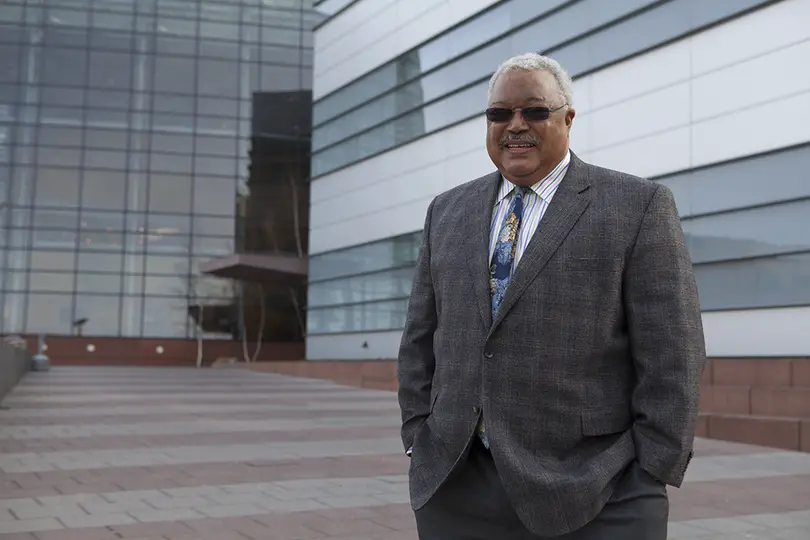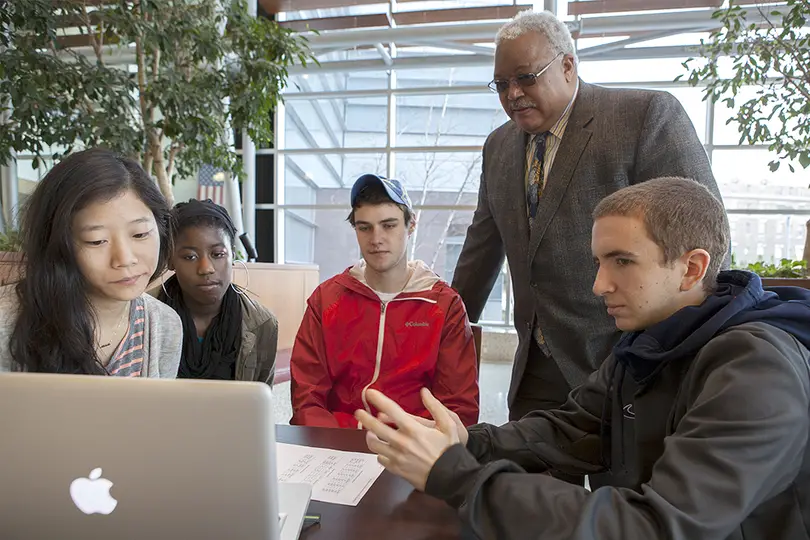Return on investment: During time at Whitman, Dean Melvin Stith worked to build student-centered community
Melvin Stith’s wife, Patricia, could not find the photo she was looking for.
She clicked feverishly on every photo icon on her desktop computer in her office in Crouse-Hinds Hall. She was sure she had the picture, she just did not remember what she had done with it. Suddenly, a photo popped up that made her chuckle loudly.
“Look at him!” she pointed at her screen. A man with a large Afro and mustache stood on a lawn on campus next to an “MBA” sign. “That’s Mel, back in the 70s, if you can believe that!”
Though Stith completed his master of business administration, and later his doctorate, at Syracuse University — he wasn’t supposed to come back, let alone become dean of the Martin J. Whitman School of Management for nine years. That is, until he was accidentally mistaken as the new Whitman dean.
Nine years ago, Stith decided to stop by the business school to visit his old professors while escorting his son, William, to campus for the beginning of his first semester of graduate school.
On that same day, Whitman officials were hoping to hear from the school’s potential new dean. When Stith walked from department to department, people assumed he was the candidate.
“I’m just here to bring my son,” he insisted.
The candidate turned down the deanship and the offer was extended to Stith, who accepted the job in just a matter of weeks.
Now, in just a matter of weeks, Stith is leaving SU. In a decade, he molded the school into one that focused on supporting diversity and veterans’ affairs. But he mostly focused on turning Whitman into a brand of high collegiality, where the students come first.
“I had to be dean,” Stith said. “I walked onto this campus as a student and felt welcome, and wanted Whitman students to feel the same. I like to talk about the SU of my dreams — that’s it.”
‘A debt of gratitude
The photo Patricia Stith was looking for was of Stith with his family of nine. Originally, the family consisted of 10 — Stith’s younger brother William was a second lieutenant and medic during the Vietnam War. He and all but one person managed to escape a building fire during the war, but after realizing a young man was trapped in the building, William rushed in to save him. An explosion killed them both, Patricia said.
Stith was also a veteran, and left the U.S. Army after receiving a Teletype in Vietnam offering him a scholarship to SU. If he wanted to take it, a helicopter would fly him out of the jungle the next day, the Teletype read.
“And he goes, ‘Do I want to take it? Of course I do.’ And he got de-commissioned and came straight here,” recalled Clint Tankersley, one of Stith’s first professors at SU in 1974 and Whitman’s current associate dean of undergraduate programs.
Mike Haynie, founder of the Institute for Veterans and Military Families at SU, approached Stith with the concept of the Entrepreneurship Bootcamp for Veterans with Disabilities, which aimed to empower wounded veterans through business ownership. He believed it was the kind of program Whitman stood for, Haynie said.
Haynie said he believes the growth of the EBV program will be integral to Stith’s legacy and extend to the eight other universities partnered with the program. Since its 2007 inception, more than 600 wounded veterans have realized their full potential through entrepreneurship.
“Each and every one of those men and women owe Mel Stith a debt of gratitude for his vision and commitment to them,” Haynie said.
Stith said his support for the program was an easy decision to make, particularly with SU’s rich association with World War II programs — and with Martin J. Whitman being a veteran himself.
“You always wish you’d have a signature program in your career, and for me, that’s it,” Stith said.
‘I definitely want to walk in his footsteps’
In her search for the photo of Stith and his family, Patricia pulled up one of her husband smiling widely next to her, along with their three children. She calls her husband a listener, something that was apparent in raising their kids and pivotal to his goal of giving his students individual attention.
“Mel calls me ‘Type A.’ I’m the person who says, ‘This is what you’re supposed to do, this is what you need to do it, now go get the job done.’ That’s me. Where Mel says, ‘Oh, I understand! I understand exactly what you mean, yeah,’” Patricia said, laughing loudly.
It’s a quality Willie Reddic, a doctoral student, noticed in Stith immediately. Reddic came to know Stith through a faculty member at Florida State University, back when Stith served as dean there. When Reddic contacted Stith about coming to Syracuse, Stith flew him out and surprised Reddic with his genuineness.
Reddic considers Stith a father figure and mentor. He recently accepted a faculty position at DePaul University in Chicago, and credits Stith entirely.
“He made me want to become a dean, and gave me direction in what to do with my life,” he said. “He made it crystal clear to me that I definitely want to walk in his footsteps.”
Stith said it’s this mentoring role that puts students at ease.
“You’re in this business because of the students,” he said.
Family man
Upon leaving Whitman, Stith said he plans to take a sabbatical, which he hopes to spend volunteering with different groups.
Vice Chancellor and Provost Eric Spina applauds Stith for his “humanity,” evident through initiatives such as the national doctoral project Stith founded, which focuses on increasing the number of black, Hispanic and American Indian business faculty members. The local effect of the project here in Syracuse, Spina said, has been transformational.
“His ability to understand the difficulties that people face and support them through difficult situations is really remarkable,” he said.
Patricia predicts Stith will spend the year doing the same volunteer work he did before he was dean. Once a week, he’ll go to the elementary school and help students with spelling. Just Monday morning, Patricia saw his car parked in the Crouse Hospital parking lot, as he’s chairman of the Crouse Hospital Foundation. He’ll fish, too, she said as she pulled up a photo of them vacationing in Miami.
She still couldn’t find the photo she was looking for, the one of Stith with his extended family. But as Patricia listed off what she thinks Stith will do in the next year, family time isn’t included. She listed off business-related projects, how he’ll come back to Whitman all the time and how he’ll stay in Syracuse, and one thing became clear.
Whitman is his family.
Published on April 23, 2013 at 12:46 am
Contact Marwa: [email protected] | @marwaeltagouri






